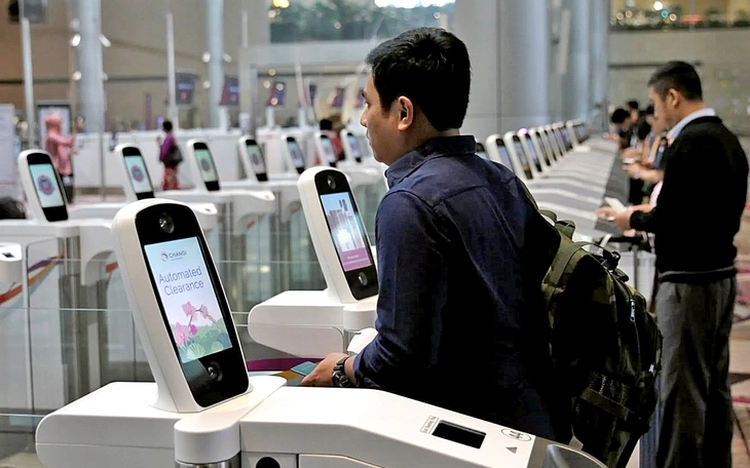
Passengers pass through an automated immigration control gate at Terminal 4 of Changi Airport in Singapore. Photo: Reuters
A recent incident at Phu Quoc International Airport off the coast of Kien Giang Province in southern Vietnam, where an immigration officer tore up the boarding pass of a Taiwanese female tourist, has stirred public outrage.
Although after the event was made public on May 14, a representative from the immigration unit at Phu Quoc International Airport issued an apology through the relevant tour company to the tourist and her family, many readers still believe the staff involved should be held accountable for damaging the image of both the tourism industry and the country.
Nhat Nguyen, a frequent flyer, shared his opinions about airport service and the importance of a smile.
On a recent business trip to Singapore, he quickly completed immigration procedures using the automated system, as usual.
While this process is familiar to him, his younger colleague, who was visiting Singapore for the first time, was amazed.
He was in awe of how efficiently the process worked, saving time and allowing passengers to complete all procedures without speaking to an immigration officer.
In contrast, at several airports, staff speak curtly to passengers, sometimes even abandoning their posts to chat with colleagues while travelers wait in line.
In the most extreme case, like in Phu Quoc, a boarding pass was ripped up in front of a tourist.
Not just Singapore, other places Nguyen has visited such as Taiwan, Hong Kong, South Korea, Japan, and most recently Thailand also boast automated immigration systems.
Passengers simply scan their passports, boarding passes, and use facial or fingerprint recognition. The entire process often takes just a few seconds or minutes.
These systems eliminate long queues and give travelers more time to rest, relax, and prepare for their next journey.
As a result, travelers leave with a sense of satisfaction and are more likely to spend on airport services like food and shopping.
Airports and businesses benefit from increased revenue, and immigration staff have reduced workloads, needing only to assist those who cannot use the automated systems.
While most places still require manual immigration for arrivals, they often feature clear signage, well-marked directions, and friendly staff guiding passengers through the process.
Thailand and Hong Kong even display signs showing estimated waiting times from various points in the queue—15, 20, or 30 minutes.
What is most commendable is that immigration officers in these countries maintain a cheerful and polite demeanor, consistently using phrases like 'please' and 'thank you,' despite dealing with large crowds all day.
Their warmth and empathy create a strong first impression for travelers who may be exhausted after long journeys, jet lag, and weather changes.
In Singapore, even with automated systems, they still maintain manual lanes, and never forget to place small trays of candy for passengers to enjoy while waiting. These seemingly small things contribute greatly to a pleasant experience.
On the other hand, on travel forums and review sites, many travelers complain about airport staff in Vietnam being abrupt, using incomplete sentences, showing no facial expression, and never offering a smile or a greeting.
Whether arriving or departing, such interactions leave tourists with a negative impression.
Airports with modern design, useful amenities, and convenient connections certainly attract travelers and become preferred transit hubs.
Similarly, destinations with stunning scenery and delicious food naturally appeal to tourists.
But the friendliness of airport immigration staff is also part of the tourism experience. It is both a warm welcome and a sincere farewell.
A smile, a greeting, a kind gesture—these are not difficult. So why hold back from offering them to passengers?
* This article was originally written in Vietnamese by Nhat Nguyen and rewritten in English by Tuoi Tre News.


Max: 1500 characters
There are no comments yet. Be the first to comment.